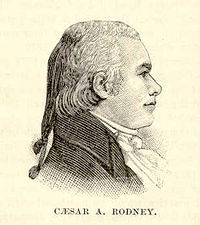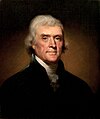Caesar Augustus Rodney
This article needs additional citations for verification. (March 2013) |
Caesar A. Rodney | |
|---|---|
James Bayard | |
| Succeeded by | James M. Broom |
| 6th United States Attorney General | |
| In office January 20, 1807 – December 5, 1811 | |
| President | Thomas Jefferson James Madison |
| Preceded by | John Breckinridge |
| Succeeded by | William Pinkney |
| Personal details | |
| Born | January 4, 1772 Dover, Delaware Colony, British America |
| Died | June 10, 1824 (aged 52) Buenos Aires, United Provinces of the Río de la Plata |
| Political party | Democratic-Republican |
| Spouse | Susan Hunn |
| Education | University of Pennsylvania (BA) |
Caesar Augustus Rodney (January 4, 1772 – June 10, 1824) was an American lawyer and politician from
Early life and family
Rodney was born in Dover in the Delaware Colony, son of Thomas Rodney and Elizabeth Fisher. He was the nephew of Caesar Rodney, the signer of the Declaration of Independence who is depicted on the Delaware state quarter. After graduating from the University of Pennsylvania in 1789, he studied law under Joseph B. McKean in Philadelphia and was admitted to the bar in 1793. He practiced law in Wilmington and New Castle, Delaware, for the next three years. Rodney married Susan Hunn, the daughter of Captain John Hunn, and their home was "Cool Springs", located in Wilmington.
Professional and political career
Rodney served six terms as State Representative, from the 1797 session through the 1802 session. There he became one of the leaders of the Jeffersonian party, now known as the Democratic-Republican Party. Encouraged by Jefferson to compete for the U.S. House against the staunch
After serving one term in the U.S. House from March 4, 1803, until March 3, 1805, he was defeated for reelection in 1804 by Bayard, by nearly as close a vote. The two men, always vigorous political opponents, remained good friends throughout their tumultuous political careers.
While Rodney spent most of his legal career in public service, he took on at least one notable case as a private advocate during the year before his appointment as Attorney General. In 1806, he made an appearance before the Mayor's Court of Philadelphia to defend the Philadelphia Cordwainers against a common law charge of conspiracy. The conspiracy charge was instituted by retail shoe merchants, based on attempts by the journeyman shoe and boot makers, to organize for the purpose of setting their wages and hours. Rodney was unsuccessful in attaining an acquittal for the workers.
Attorney general

On January 20, 1807, U.S. President Thomas Jefferson named Rodney his U.S. Attorney General. He served in that office for the remainder of Jefferson's term and for nearly three years in President James Madison's first term. As Attorney General, Rodney participated as a member of the prosecution during the second treason trial of former Vice-President Aaron Burr. Rodney resigned December 5, 1811, unhappy about being passed over for a U.S. Supreme Court appointment. During the War of 1812, he was captain of a rifle corps which became the Delaware 1st Artillery. They served at Fort Union in Wilmington, on the Canadian frontier, and assisted in the defense of Baltimore in 1814.
Later political activity
Rodney returned to politics, serving in the
Along with
Death and legacy
Rodney died June 10, 1824, in Buenos Aires, and was buried there in the Victoria district British Cemetery. His remains were moved to a crypt at St. John's Cathedral in Buenos Aires. The crypt is at the peristyle of the entrance of the cathedral.[2]

Almanac
Elections were held the first Tuesday of October. Members of the General Assembly took office on the first Tuesday of January. State Representatives were elected for one year. U.S. Representatives took office March 4 and have a two-year term. The General Assembly chose the U.S. Senators, who also took office March 4, but for a six-year term. In this case the General Assembly failed to fill the position for nearly a year.
| Public Offices | |||||||
|---|---|---|---|---|---|---|---|
| Office | Type | Location | Began office | Ended office | notes | ||
| State Representative | Legislature | Dover | January 3, 1797 | January 2, 1798 | |||
| State Representative | Legislature | Dover | January 2, 1798 | January 1, 1799 | |||
| State Representative | Legislature | Dover | January 1, 1799 | January 7, 1800 | |||
| State Representative | Legislature | Dover | January 7, 1800 | January 6, 1801 | |||
| State Representative | Legislature | Dover | January 6, 1801 | January 5, 1802 | |||
| State Representative | Legislature | Dover | January 5, 1802 | January 4, 1803 | |||
| U.S. Representative | Legislature | Washington, D.C. | March 4, 1803 | March 3, 1805 | |||
| U.S. Attorney General | Executive | Washington, D.C. | January 20, 1807 | December 5, 1811 | |||
| State Senate | Legislature | Dover | January 3, 1815 | January 6, 1818 | |||
| U.S. Representative | Legislature | Washington, D.C. | March 4, 1821 | January 22, 1822 | |||
| U.S. Senator | Legislature | Washington, D.C. | January 10, 1822 | January 29, 1823 | |||
Resident Minister
|
Executive | Buenos Aires | January 29, 1823 | June 10, 1824 | Argentina | ||
| Delaware General Assembly service | ||||||
|---|---|---|---|---|---|---|
| Dates | Assembly | Chamber | Majority | Governor | Committees | District |
| 1797 | 21st | State House | Federalist
|
Gunning Bedford, Sr.
|
New Castle at-large
| |
| 1798 | 22nd | State House | Federalist
|
Daniel Rogers | New Castle at-large
| |
| 1799 | 23rd | State House | Federalist
|
Richard Bassett | New Castle at-large
| |
| 1800 | 24th | State House | Federalist
|
Richard Bassett | New Castle at-large
| |
| 1801 | 25th | State House | Federalist
|
James Sykes | New Castle at-large
| |
| 1802 | 26th | State House | Federalist
|
David Hall
|
New Castle at-large
| |
| 1815 | 39th | State Senate | Federalist
|
Daniel Rodney | New Castle at-large
| |
| 1816 | 40th | State Senate | Federalist
|
Daniel Rodney | New Castle at-large
| |
| 1817 | 41st | State Senate | Federalist
|
John Clark
|
New Castle at-large
| |
| United States Congressional service | ||||||
|---|---|---|---|---|---|---|
| Dates | Congress | Chamber | Majority | President | Committees | Class/District |
| 1803–1805 | 8th | U.S. House | Republican
|
Thomas Jefferson | at-large
| |
| 1821–1823 | 17th | U.S. House | Republican
|
James Monroe | 2nd at-large
| |
| 1821–1823 | 17th | U.S. Senate | Republican
|
James Monroe | class 1
| |
| Election results | |||||||||||
|---|---|---|---|---|---|---|---|---|---|---|---|
| Year | Office | Subject | Party | Votes | % | Opponent | Party | Votes | % | ||
1802
|
U.S. Representative
|
Caesar A. Rodney | Republican
|
3,421 | 50% | James A. Bayard
|
Federalist
|
3,406 | 50% | ||
1804
|
U.S. Representative
|
Caesar A. Rodney | Republican
|
4,038 | 48% | James A. Bayard
|
Federalist
|
4,398 | 52% | ||
References
- ISBN 978-0-7546-3978-7.
- ^ "Historias, Instituciones, Personajes". Archived from the original on December 9, 2013. Retrieved November 16, 2018.
- Commonwealth v. Pullis ("The Philadelphia Cordwainers' Case"), Mayor's Court of Philadelphia (1806)
- Conrad, Henry C. (1908). History of the State of Delaware. Lancaster, Pennsylvania: Wickersham Company.
- Martin, Roger A. (1995). Memoirs of twenty-two years in the Delaware State Senate. Newark, Del.: Roger A. Martin. OCLC 34016846.
- Martin, Roger A. (2003). Delawareans in Congress. Middletown, Del.: Roger A. Martin. OCLC 56794580.
- Munroe, John A. (1954). Federalist Delaware 1775–1815. New Brunswick, N.J.: Rutgers University Press. OCLC 1867660.
- Read, William T. (1853). Biographical Sketch of Caesar Augustus Rodney. Wilmington, Del.: C. P. Johnson. OCLC 13813351.
- Ryden, George Herbert (1943). Biographical Sketches of Caesar Rodney (the Signer) Thomas Rodney and Caesar A. Rodney. Dover, Del.: Public Archives Commission. OCLC 8230494.
- Scharf, John Thomas (1888). History of Delaware 1609–1888. 2 vols. Philadelphia: L. J. Richards & Co. ISBN 0-87413-493-5.
- Wilson, W. Emerson (1969). Forgotten Heroes of Delaware. Cambridge, Mass.: Deltos Publishing Company. OCLC 56456.






